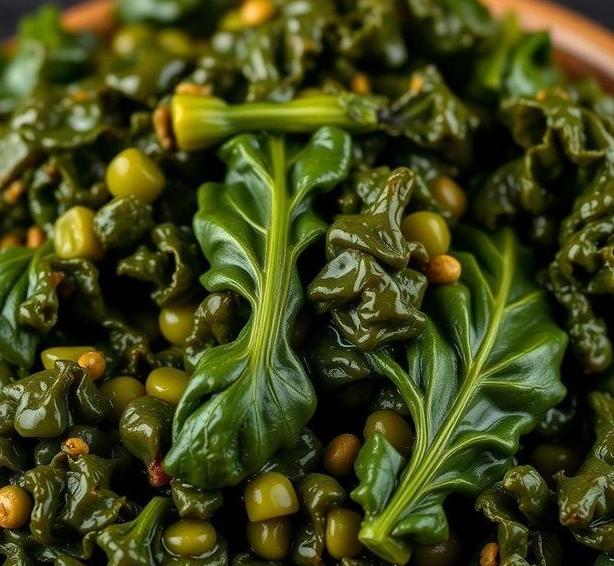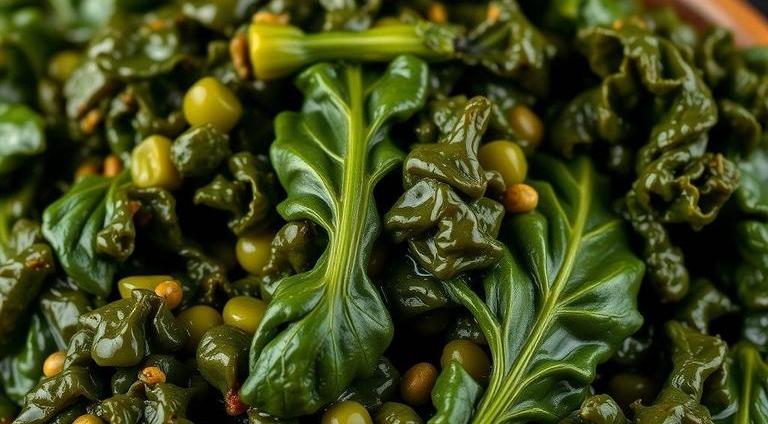Cooked collard greens are a delicious and nutritious addition to many meals, especially for those who enjoy Southern cuisine or leafy green vegetables. But as with any cooked food, you might find yourself wondering how long these vibrant greens can last after cooking. Whether you’ve prepared a big batch for a family gathering or have leftovers that you want to save, understanding how to properly store and recognize spoilage can save you from wasting food-and avoid any stomachaches from eating something that’s past its prime.
In this guide, we’ll dive into everything you need to know about the shelf life of cooked collard greens, how to spot signs of spoilage, and how to store them correctly so that you can enjoy them at their freshest. Let’s explore!
Can Cooked Collard Greens Go Bad?
Absolutely. While collard greens are hearty and can be a bit more resilient than other vegetables, cooked greens-like any other cooked food-can go bad over time if not stored properly. When cooked, the moisture in the greens, combined with their high fiber content, creates the perfect environment for bacteria to grow.
Even if you’ve cooked them to perfection, there are several factors that influence how long they’ll stay safe to eat. Improper storage, exposure to heat or air, and how long they’re left out at room temperature can all contribute to spoilage.
It’s important to keep in mind that just because collard greens are cooked doesn’t mean they’ll last forever. The quality of the greens can degrade, and over time, they may even become unsafe to consume. But don’t worry-by following some simple guidelines for storage and knowing the signs of spoilage, you can keep your cooked collard greens in great shape for as long as possible.
Shelf Life For Cooked Collard Greens

The shelf life of cooked collard greens varies depending on several factors, including how they’re stored, the cooking method, and whether they’ve been exposed to contamination. Here’s a breakdown of how long cooked collard greens typically last under different conditions:
-
Refrigeration (within 2 hours of cooking): If stored in the fridge promptly after cooking, collard greens will last about 3 to 5 days.
- Tip: Make sure they’re in an airtight container to prevent air exposure, which can cause them to spoil faster.
-
Freezing (properly wrapped): Cooked collard greens can be frozen for up to 10 to 12 months if stored in a freezer-safe container or tightly wrapped in plastic and aluminum foil.
- Tip: Freezing will change the texture slightly, but the greens will retain their flavor and nutritional value.
- Room Temperature: If left at room temperature for more than 2 hours, cooked collard greens can begin to spoil quickly. This is because bacteria multiply rapidly at temperatures between 40°F and 140°F (the “danger zone” for food safety).
Common Signs Of Spoilage
Knowing when your cooked collard greens have gone bad is key to avoiding foodborne illnesses. While they may not always show visible signs, there are some reliable indicators that you should look out for:
- Off Smell: Fresh collard greens have a distinct, earthy smell, but once they begin to spoil, they can give off a sour, rotten, or fermented odor. If the scent seems unpleasant, it’s best to discard them.
- Slimy Texture: If your collard greens feel slimy or excessively mushy when touched, this is a clear sign that they’ve begun to spoil. This texture change is caused by bacteria or mold growth.
- Discoloration: Cooked collard greens are typically a rich green color, but as they age, they can become yellowish or brownish, especially at the edges. This isn’t always a sign of spoilage, but if combined with other factors (like odor or texture), it can be an indication that they are no longer safe to eat.
- Mold Growth: Any visible mold, whether white, green, or black, should immediately be taken as a sign that the greens have spoiled and are unsafe to consume.
- Unusual Taste: While it’s harder to detect from just looking or smelling, if you’ve kept your cooked collard greens too long and decide to taste them, a sour, bitter, or off-putting flavor is a dead giveaway that they’ve gone bad.
How To Store Cooked Collard Greens?

Proper storage is essential to maximizing the shelf life of your cooked collard greens. Here are some tips on how to store them effectively, whether in the refrigerator or freezer:
In The Refrigerator
- Cool Them Quickly: Let your cooked collard greens cool down to room temperature before refrigerating them. However, don’t leave them out for more than two hours. If you’re in a hurry, you can speed up the cooling process by placing the greens in shallow containers.
- Airtight Containers: Always store cooked collard greens in airtight containers or resealable bags to limit exposure to air. This keeps moisture in, prevents contamination, and minimizes the chance of them absorbing odors from other foods in the fridge.
- Label and Date: For better organization, label the container with the date you cooked the greens. This will help you keep track of how long they’ve been stored and ensure you don’t eat them beyond the safe time frame.
In The Freezer
- Cool Before Freezing: Just like with refrigeration, allow the greens to cool before freezing them. You want to avoid placing hot food directly in the freezer, as this can raise the temperature inside and affect the overall freezing process.
- Use Freezer-Safe Bags or Containers: When freezing cooked collard greens, use freezer-safe bags or containers. Make sure to remove as much air as possible from the bags before sealing them. You can also portion the greens into individual servings, which makes thawing easier when you’re ready to eat.
- Consider Blanching: Some people choose to blanch their greens before freezing, which involves briefly boiling them and then plunging them into ice water. This can help preserve the color and texture of the greens, although it’s not strictly necessary for cooked collards.
Don’t Overcrowd: Whether In The Fridge Or Freezer, Make Sure Your Container Isn’t Overcrowded. Allow The Greens To Cool Properly And Evenly, And Make Sure They Have Plenty Of Space To Maintain Their Freshness.
Expert Tips
- Use Fresh Greens for Best Results: Collard greens that are fresher when you cook them tend to last longer and maintain their flavor better after being stored. If you’re starting with older greens, the shelf life might be shorter.
- Reheat Properly: If you’re reheating your cooked collard greens, do so thoroughly. Heat them to at least 165°F (74°C) to ensure they’re safe to eat. You can reheat in a pan, microwave, or even in the oven. If reheating from frozen, thaw them first for the best results.
- Don’t Store Collard Greens with Other Leftovers: Collard greens can sometimes absorb flavors from other foods, which can affect the taste. If you plan to store leftovers, keep them separate from other ingredients, especially strongly flavored ones like onions or garlic.
- Avoid Repeatedly Reheating: It’s best to reheat only the portion you plan to eat. Repeated reheating can affect both the texture and safety of the greens.
FAQs
Can Cooked Collard Greens Go Bad If Left At Room Temperature?
Yes, cooked collard greens can go bad if left at room temperature for too long. Bacteria can grow rapidly when food is left out in the temperature danger zone (40°F-140°F). It is recommended to refrigerate cooked collard greens within 2 hours of cooking to prevent spoilage.
How Long Do Cooked Collard Greens Last In The Refrigerator?
Cooked collard greens can last 3 to 5 days in the refrigerator when stored properly in an airtight container. Be sure to keep them refrigerated at or below 40°F to maintain freshness and prevent bacterial growth.
How Can I Tell If My Cooked Collard Greens Have Gone Bad?
Signs that cooked collard greens have gone bad include a sour or off smell, a slimy or mushy texture, and discoloration. If the greens appear wilted, overly soft, or have mold growth, it’s best to discard them.
Can I Freeze Cooked Collard Greens To Extend Their Shelf Life?
Yes, you can freeze cooked collard greens to extend their shelf life. When properly stored in a freezer-safe container or bag, they can last for up to 10-12 months. However, their texture may change upon thawing, becoming softer.
Can Cooked Collard Greens Cause Food Poisoning If They Go Bad?
Yes, if cooked collard greens go bad and are consumed, they can potentially cause food poisoning. Spoiled greens may contain harmful bacteria such as Salmonella or E. coli, which can lead to symptoms like nausea, vomiting, diarrhea, and stomach cramps.
What Is The Best Way To Store Cooked Collard Greens?
To store cooked collard greens, allow them to cool to room temperature before transferring them into an airtight container. Store the container in the refrigerator for up to 5 days or freeze them for longer storage. Make sure to reheat thoroughly before eating.
Can I Store Cooked Collard Greens In A Metal Container?
It is not recommended to store cooked collard greens in a metal container for long periods, as the metal can react with the food, leading to an off taste or discoloration. It’s better to use glass or plastic airtight containers for storage.
Do Cooked Collard Greens Lose Nutrients After Going Bad?
Yes, cooked collard greens lose nutrients as they spoil. The longer they remain in an unsafe storage environment, the more likely they are to lose essential vitamins, minerals, and antioxidants, along with their overall taste and texture.
Can I Eat Collard Greens After The ’use By’ Date If They’ve Been Cooked?
It depends on the condition of the cooked collard greens. The ’use by’ date is a guideline for optimal freshness. If the greens have been stored properly and show no signs of spoilage, they might still be safe to eat. However, if there are any signs of spoilage like bad odor, sliminess, or discoloration, it’s safer to discard them.
Can I Reheat Cooked Collard Greens Multiple Times?
It is not recommended to reheat cooked collard greens multiple times as this can affect their texture and flavor. Each time they are reheated, there is a risk of bacterial growth if they are not heated properly. It’s safest to only reheat them once and eat them immediately after.